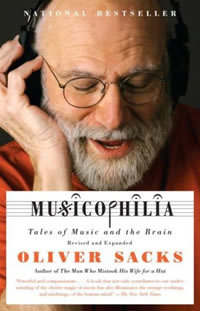Book Notes
 Oliver Sacks, Musicophilia; Tales of Music and the Brain (New York: Alfred A. Knopf, 2007), 381pp.
Oliver Sacks, Musicophilia; Tales of Music and the Brain (New York: Alfred A. Knopf, 2007), 381pp.
Whenever my daughter has a tune in her head that she can't shake, she's devised an interesting solution. "Turn on the radio," she says, "I gotta hear some different music." In effect, she tricks her brain and diverts it from one musical function to another. In this his tenth book, Oliver Sacks, Professor of Clinical Neurology and Psychiatry at Columbia University, explores how the brain processes music. As in his other books, Sacks compiles dozens of "clinical anecdotes." These are informal, inherently fascinating, and deeply human case histories of his patients. In addition, he shares at length from letters that he has received, scientific studies, the results of brain imaging techniques, and his own personal experiences.
Rooted in his own deep love for and skill in music, Sacks examines how music impacts "almost every aspect of brain function." If that sounds far-fetched, consider the range of his topics. There's musical imagery, whereby you "listen" to a tune in your mind even though there is no sound. As experience shows, this can be either voluntary or involuntary, sometimes an obsession or even something like a "possession" by the music. A long chapter explores "musical hallucinations." There are forays into amusia, dystimbria, dysharmonia, perfect pitch, and musical savants. He analyzes the relationship of music and blindness, music and color, music and speech, Parkinson's disease, Tourette's syndrome, dreams and dementia. Sometimes musicophilia results from a seizure; at other times music induces a seizure.
Sacks's book is an extended case study of the brain-mind relationship. And most mysterious of all is the question whether music even has any meaning. "While [music] is most closely tied to the emotions, music is wholly abstract; it has no formal power of representation whatever. We may go to a play to learn about jealousy, betrayal, vengeance, love — but music, instrumental music, can tell us nothing about these. Music can have wonderful, formal, quasi-mathematical perfection, and it can have heartbreaking tenderness, poignancy, and beauty. … But it does not have to have any 'meaning' whatever" (37). Such is the mystery of music, that although it conveys no inherent meaning, no one would question its power.


